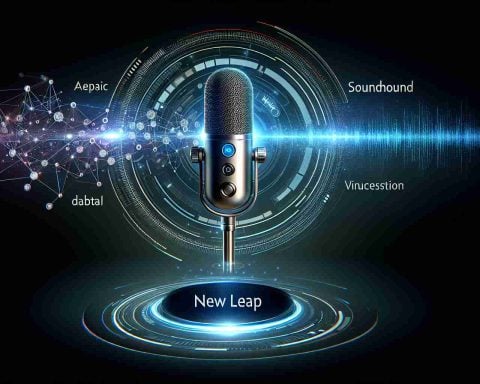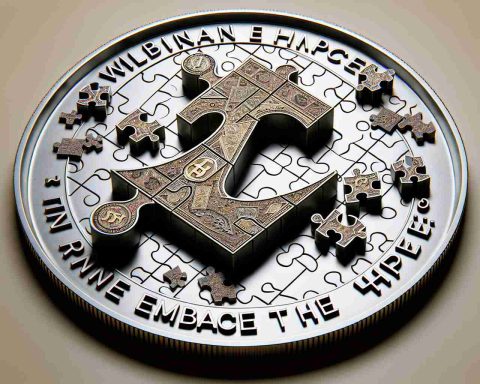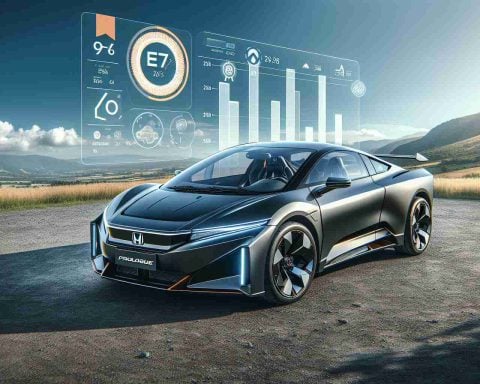- CATL leads China’s EV battery market with installations reaching 18.25 GWh in January, capturing nearly half of the market share.
- BYD experiences a slight decline in market share due to decreased sales of new energy vehicles.
- Total power battery installations in China surged to 38.8 GWh in January, marking a significant year-on-year increase.
- Emerging players like CALB and Gotion High-tech are gaining ground in the market.
- Lithium iron phosphate (LFP) batteries dominate the market, comprising over three-quarters of January’s installations.
- Lithium ternary batteries show a decline in both production and installation.
- The competition in China’s EV battery market continues to intensify as players focus on balancing demand with innovation.
A fresh current stirs through China’s electric vehicle (EV) battery market as January reveals dynamic shifts among its top players. CATL powers forward, capturing a greater slice of the market while rival BYD sees a slight retreat.
Above the sprawling industrial landscape, CATL emerges as a leader, with its battery installations in January reaching a formidable 18.25 GWh. This achievement secures nearly half of China’s market, a testament to its resilience as it nudges its share up from December’s figures. Meanwhile, BYD trails as its foothold slips, a modest dip attributed to tumbling sales of new energy vehicles during China’s seasonal ebb.
Alongside this thrilling competition, China experiences a surge in power battery installations, reaching 38.8 GWh in January. This represents an impressive year-on-year increase, yet it pales against December’s frenetic activity. Beneath these fluctuations lies a competitive shift: CALB and Gotion High-tech carve their niches, steadily advancing in market share.
In a market driven by innovation, lithium iron phosphate (LFP) batteries assert dominance, making up over three-quarters of January’s installs. CATL, BYD, and Gotion anchor themselves firmly as leaders in this domain. Meanwhile, the spotlight remains on lithium ternary batteries, witnessing a measured decline in both production and installation.
Amidst fluctuating trends, one truth endures: the race for dominance in China’s EV battery landscape intensifies, with each player vying for harmony between demand and innovation. For CATL, the path ahead gleams ever brighter, a beacon for the evolving tides of energy. The saga unfolds as the market resonates with electrifying promise—a testament to China’s growing pulse in the global EV narrative.
How China’s Battery Titans Shape the Future of Electric Vehicles
How-To Steps & Life Hacks: Maximizing Battery Efficiency
To maximize the efficiency of your EV battery, consider the following steps:
1. Charge Smartly: Avoid always charging to 100% or draining to 0%. Optimal battery life is maintained between 20% and 80%.
2. Temperature Management: Park in the shade during summer and keep the vehicle warm in freezing temperatures to prevent battery degradation.
3. Monitor Software Updates: Manufacturers like CATL and BYD regularly release updates that enhance battery performance—ensure your vehicle’s software is current.
Real-World Use Cases: Impact on Manufacturers and Consumers
Chinese companies like CATL and BYD are instrumental in pushing forward the EV market. For manufacturers, staying on top of battery technology translates to greater competitiveness. Consumers benefit from longer driving ranges and lower vehicle maintenance costs.
Market Forecasts & Industry Trends
As of 2023, China continues leading the global EV battery market, largely due to advancements in lithium iron phosphate (LFP) technologies. Analysts predict China’s market will grow at a CAGR of approximately 17% over the next five years, driven by government incentives and increasing EV adoption. Company dominance, like that of CATL, is anticipated to grow further.
Reviews & Comparisons: CATL vs. BYD
– Performance: CATL batteries generally offer longer range and quicker charging capabilities.
– Durability: BYD batteries are often praised for their robustness and consistent performance in various conditions. However, CATL has made significant strides in increasing their lifespan.
Controversies & Limitations
One of the main controversies surrounding EV batteries is the environmental impact of lithium mining, which affects their sustainability. Additionally, while LFP batteries are becoming increasingly popular due to their safety and cost, they generally have lower energy density compared to lithium ternary batteries.
Features, Specs & Pricing
– CATL: Known for diverse applications, CATL’s batteries cover electric vehicles, energy storage systems, and more. Pricing details are typically confidential and vary significantly based on application and volume.
– BYD: Offers integrated solutions with their “Blade Battery” technology, focusing heavily on safety and lifespan.
Security & Sustainability
– Security: LFP batteries used by firms like CATL and BYD have a lower risk of overheating and catching fire under standard conditions.
– Sustainability: Companies are investing in recycling programs to reduce the ecological footprint, although this remains a significant challenge.
Insights & Predictions
China’s EV battery manufacturers are likely to continue capitalizing on advances in LFP technology. Expect more partnerships between global automakers and Chinese battery suppliers to emerge as international demand surges.
Tutorials & Compatibility
For potential EV buyers, platforms like CATL, BYD, and Gotion batteries should be prioritized based on vehicle compatibility, charging infrastructure, and specific use-case scenarios.
Pros & Cons Overview
Pros:
– High energy efficiency and growing market influence in China.
– Strong government backing and financial incentives for EV adoption.
– Leading innovation in battery technology, particularly in LFP.
Cons:
– Environmental impact of production and resource extraction.
– Dependency on continuous technology advancement to maintain market share.
Actionable Recommendations
1. Adaptive Charging: Develop a charging schedule to align with non-peak hours where possible.
2. Stay Informed: Monitor the latest trends on battery technology; companies like CATL frequently release insightful reports.
3. Evaluate Compatibility: For prospective EV owners, evaluate battery type and infrastructure compatibility before purchase.
For more insights, explore battery market trends on CATL and BYD.



















